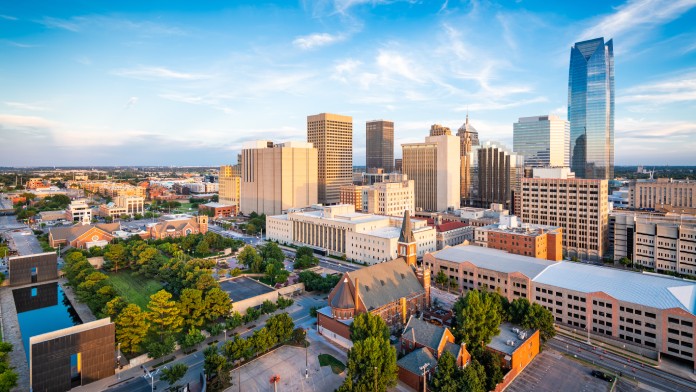Expert Insights
The Cherokee Nation of Oklahoma is the nation’s largest Native American tribe, with well over 441,000 currently enrolled citizens. They are also a member of the states who sued pharmaceutical giants who played a large role in creating and expanding the nation’s opioid crisis back in 2017. The pharmaceutical companies agreed to a settlement, and the Cherokee will receive a large portion of that settlement amount. As for the Cherokee Nation of Oklahoma, they plan to use $18 million of the total $98 million in opioid settlement funds to build a 50-bed, 17,000-square-foot treatment facility in Tahlequah, Oklahoma, which is the headquarters for the tribe. TAccording to tribal spokespeople, the facility will be completely operated by members of the tribe and provide free addiction treatment for Cherokee Nation citizens who need services.
~ Rita Milios
Top 4 Drug Rehabs in Oklahoma City, OK
Every alcohol and drug rehab in Oklahoma City offers its own set of unique amenities, programs, and therapies. Evidence-based treatment is available at multiple inpatient centers in Oklahoma City. These facilities often provide a range of therapies, faith-based treatments, and outpatient options for recovery.
Below are the top four addiction treatment centers in Oklahoma City based on the following criteria:
- Offering evidence-based treatment
- Accreditation
- Certifications
- Client testimonials / reviews
Landmark Recovery Oklahoma City
Landmark Recovery Oklahoma City is located 14 minutes northwest of downtown Oklahoma City, off US Route 66. The 60-bed residential facility offers a gym, courtyard, recreational space, and semi-private bathrooms.
Treatment programs include:
- Medical Detox Treatment
- Inpatient Rehab
- Partial Hospitalization Program
- Outpatient Program (OP)
- Family Counseling
- Mindfulness Therapy
- Recreational Activities
- On-site Recovery Group Meetings (SMART Recovery, 12-Step)
- Aftercare Support
Treatment programs are supported by:
- Joint Commission
- LegitScript
Location and contact information:
2412 North Ann Arbor Avenue
Oklahoma City, OK 73127
405-896-8426
The Recovery Center
The Recovery Center is located midway between Uptown Oklahoma City and Downtown Oklahoma City. They provide culturally competent, trauma-informed services for drug, alcohol, and co-occurring disorders, as well as medically supervised detox treatment in an outpatient setting.
Treatment programs include:
- Outpatient Treatment
- Intensive Outpatient Treatment
- Dual Diagnosis Treatment
- Family Therapy
- Rehabilitation Services
- Wellness-Related Services and Activities
- Case Management Servic
Treatment programs are supported by:
- Commission on Accreditation of Rehabilitation Facilities
Location and contact information:
1215 Northwest 25th Street
Oklahoma City, OK 73106
405-525-2525
Rob’s Ranch
Rob’s Ranch, a Christian-focused addiction treatment center for men, is located on a 72-acre ranch one mile southwest of Interstate 35 at exit 98 (Johnson Road exit) on Highway 74, in Purcell, about 35 miles from Oklahoma City. The residential program, housing 40 clients, provides 24 hours of spiritual growth and therapy each week, and features amenities including a swimming pool and fishing pond.
Treatment programs include:
- Detox
- Inpatient Rehab
- Alcohol Disorder Treatment
- Drug Disorder Treatment
- Men’s Program
- Cognitive Behavioral Therapy
- Trauma Therapy (EMDR)
- Sexual Addiction Therapy
- 12-Step Recovery
- Family Education Day
- Couple’s Therapy
- Pool
- Fishing Pond
- Fitness Center
Location and contact information:
23899 Oklahoma 74
Purcell, OK 73080
405-253-3838
Catalyst Behavioral Services Community House Residential Program
Catalyst Behavioral Services Community House Residential Program, located in a residential neighborhood in the Culbertson East Highland area in the heart of Oklahoma City, is a 55-bed co-educational treatment center for chemical dependency and mental illness. The Community House has semi-private bedrooms, entertainment rooms, and basketball, volleyball, and exercise areas.
Treatment programs include:
- Residential Rehab Program
- Dual Diagnosis Treatment
- Mental Health Treatment
- Medication Management
- Adult Program
Location and contact information:
1501 Northeast 11th St.
Oklahoma City, OK 73117
405-230-1138
How Does Oklahoma City Compare in Alcohol and Drug Use?
The state of Oklahoma has struggled with significant rates of addiction and overdose. The state ranked 18th in drug deaths in 2021.1 To combat the problem, there are more than 30 choices for anyone looking for alcohol and drug rehab centers in Oklahoma City.2 There are a wide variety of programs that can serve any treatment need. Many services offer free or low-cost treatment options and accept private insurance, Medicare, Medicaid, and military insurance.
In 2021, 17.2% of adults in the state of Oklahoma say they used drugs (excluding cannabis) for non-medical reasons.2
Additional stats include:2

Abuse of prescription drugs was the most reported category, followed by illicit drugs and prescription opioids.

4% of men abused illicit drugs, compared to 11.3% of women who abused illicit drugs.

People earning less than $75,000 per year had higher rates of drug use than those in other income brackets.

36% of college graduates reported illicit drug use, compared to 14.3% of people who graduated high school.
In 2020, about 12.8% of adults in Oklahoma reported excessive drinking, which includes past-month binge drinking or heavy drinking. This figure was below the national average of 17.6%.
Other 2020 statistics related to drinking in Oklahoma City include:3
of adults between the ages of 18 and 44 engaged in excessive drinking.
of men engaged in excessive drinking, compared to 8.8% of women.
of college graduates engaged in excessive drinking.
Although not everyone who engages in excessive drinking or drug use does so because of an addiction, it is often a sign of substance use disorder. Substance use also increases the risk of other health conditions, including alcohol poisoning, learning and memory problems, liver disease, and cancer. People who consume drugs or alcohol may be at higher risk for unintentional injuries and violent incidents.
How Expensive is Drug Rehab in Oklahoma City?
The cost of addiction treatment in Oklahoma City can vary widely. Your out-of-pocket expenses will depend on multiple factors, including:
Type of rehab (inpatient vs. outpatient)
Amenities and features (luxury vs. standard)
Length of treatment stay
Insurance plans accepted
Government funding
Location
A residential stay is typically more costly since it includes the price of staying on-site with meals, therapy, and other services. Luxury or executive addiction treatment centers with advanced amenities have even higher costs.
If cost is a concern, you can find free, low-cost, or sliding-scale facilities or detox centers in Oklahoma City. Some facilities offer payment plans where you make smaller payments over time.
Under the Affordable Care Act, all insurance plans must cover some treatment, so all private insurance, Medicaid, Medicare, or military insurance will help pay for addiction care. Your insurance company can tell you which facilities, services, or providers are covered.
Are There Low-Cost and Free Drug Rehab Centers in Oklahoma City?
There are no state-operated addiction treatment facilities in Oklahoma City. The state of Oklahoma partners with non-profit and private centers to certify Certified Community Behavioral Health Clinics (CCBHC), which offer services regardless of the patient’s ability to pay. The programs are generally outpatient and do not offer medical detox on-site.
SoonerCare, the state’s Medicaid program, covers substance use care, including inpatient detox. Prior authorization is required for SoonerCare participants.4
Does Insurance Cover Rehab Center Costs?
Private Insurance
If you have private health insurance through your place of work or the Healthcare Marketplace, you can use it to help pay for the cost of drug rehab in Oklahoma City as well.
Medicaid
Oklahoma residents who are low-income can qualify for SoonerCare and use this government program to pay for the expense of addiction treatment.
Medicare
Residents over the age of 65 can qualify for Medicare and use this government health program to cover drug and alcohol addiction treatment.
TRICARE
Oklahoma military personnel and retirees can use TRICARE to pay for substance abuse help.
Get help today at
800-681-1058
(Who Answers?)
.
How Do You Pay for Addiction Treatment in Oklahoma City?
There are private or non-profit facilities that help pay for care if you are uninsured. Check rehab facility websites or call to ask if they provide:
- No-cost services
- Sliding scale payments based on income level
- Payment assistance
You can discuss financial concerns with the staff at a treatment center. They will answer any questions you have about the types of assistance they offer. They can also help you set up a payment plan that allows you to get the care you need.
Some employers have programs to help you pay. Check if your workplace has an employee assistance plan that includes addiction treatment.
Apply for a Scholarship
Some non-profit organizations or treatment centers provide scholarships or grants to help cover the cost. You can ask the staff at facilities if they have scholarship or grant programs.
Find a Sliding-Scale Program
Many Oklahoma City facilities adjust costs based on what you can pay. Treatment center staff will ask you about your income, savings, and insurance. Your financial status will determine your final cost. People with higher incomes will be charged more than people with lower incomes.
Choose a Program that Offers Payment Plans
Some Oklahoma City detox centers and facilities will let you spread payments out over time. The center will work with you and your insurance company to determine your out-of-pocket share of the costs. They will offer you a schedule of payments that may or may not include interest fees.
Types of Addiction Therapy Used in Rehab
Over time, experts have developed a battery of evidence-based therapy strategies for managing addiction. Many drug rehab centers in Oklahoma City use several different types of therapy, all designed to help patients address the cause of addiction and change behaviors going forward.
Cognitive behavioral therapy (CBT): Cognitive behavioral therapy (CBT) is a talk therapy that’s used in many therapeutic settings. The goal is to teach the patient to connect their thoughts to behavior patterns.
Dialectical behavior therapy (DBT): Dialectical behavior therapy is a variation of cognitive-behavioral theory. This method is used to address extremely negative or self-destructive behaviors. Therapists work with patients on coping with negative emotions and changing harmful behaviors.
Motivational enhancement therapy: Motivational enhancement therapy helps patients set goals, strategize behavioral changes, and develop an ongoing structure to motivate them to avoid substance use.
Contingency management: Contingency management involves patients receiving positive reinforcement as a reward for particular behaviors. For example, patients get vouchers or money after a negative drug test. The goal is to reroute reward pathways in the brains so that patients learn to respond positively to rewards other than substances.
Group therapy: Group therapy is a guided therapy session where multiple people participate at once. The participants work together to discuss shared experiences, offer support, and suggest strategies to help manage behavior in the future. Groups consist of a small number of people and a trusted facilitator who can moderate the discussion.
Family therapy: Family can play a positive role in addiction treatment. Patients may have sessions with family members under the guidance of a therapist. Counselors may also provide sessions just for family members where they learn to support and encourage their loved ones during recovery.
Choosing the Right Level of Care
Compare various levels of drug and alcohol rehab to choose which one is right for you or a loved one.
Medical Detox
Professional detox services can keep you safe and comfortable while you withdraw from drugs and alcohol. Detox is usually the first step of the recovery process.
Inpatient
You receive round-the-clock care, supervision, and monitoring while attending individual therapy, group counseling, family therapy, and more.
Partial Hospitalization Programs (PHPs)
Partial hospitalization, also called day treatment, is the most intensive setting. In a PHP, you can still live at home while recovering from addiction. You attend up to 30 hours of care per week.
Intensive Outpatient
A step down in intensity from PHPs, IOPs involve between nine and 20 hours of care per week.
Standard Outpatient
Standard outpatient is the least intensive option available. It includes just a few hours of treatment per week.
Aftercare
The work doesn’t stop once you complete rehabilitation. Afterward, you’ll want to follow an aftercare plan that involves ongoing support, such as a sober living home or AA or NA.
Finding Specialized Drug Rehabs in Oklahoma City
When looking for drug and alcohol rehab centers in Oklahoma City, there are plenty of options:
Holistic
Holistic centers combine evidence-based treatments with alternative or complementary ones. These centers might offer acupuncture, massage, aromatherapy, hypnotherapy, guided meditation, and diet and nutritional interventions.
Christian and Faith-Based
People with strong religious values may feel most supported in a faith-based program. Typically, faith-based facilities use evidence-based methods and also provide opportunities for worship and religious practice.
Luxury
Luxury centers offers greater comfort, amenities, and privacy than typical facilities and may offer additional options. These facilities might be located in sought-after places, such as in the downtown area of a city or a scenic suburb. They may boast amenities such as gourmet food, fitness, swimming, yoga, or spa services.
Executive
Executive programs are intended for people who need inpatient care but can’t disconnect from work responsibilities. Executive programs permit people to stay connected to their workplaces. Under certain circumstances, business travel is allowed during treatment as well.
Dual Diagnosis
People with mental health conditions such as anxiety, depression, or PTSD are often at risk for substance abuse disorders as well. If you have been diagnosed with co-occurring disorders, you should find treatment that addresses all of your needs regarding both addiction and mental health.
Alcohol and Drug Laws in Oklahoma City
The drug laws in Oklahoma have gone through changes in recent years. Medical marijuana is legal. Possession of a small amount without a license is considered a misdemeanor if you can prove a medical condition. Possession of other drugs carries felony changes, as does possession with intent to distribute. In 2018, the state Legislature reformed drug sentencing laws to reduce prison time, but there are still mandatory sentences for drug crimes.
Oklahoma Good Samaritan Overdose Law: People who witness overdoses and call for medical help have protection under this law from prosecution for drug possession.8
Oklahoma Naloxone Access Law: Oklahoma residents can obtain over-the-counter naloxone if they know someone at risk of an opioid overdose or are at risk themselves. Some facilities offer free naloxone to those who need it.9
Alternative Sentencing for Non-Violent Drug Offenders: Drug courts give non-violent offenders the option of going to court-ordered drug addiction treatment instead of serving jail time.7
Should You Travel for Drug and Alcohol Rehab in Oklahoma City?
 Choosing where you go for treatment is a personal decision. Many factors will weigh into why you pick a particular location. Some reasons to choose a drug rehab in Oklahoma City include:
Choosing where you go for treatment is a personal decision. Many factors will weigh into why you pick a particular location. Some reasons to choose a drug rehab in Oklahoma City include:
- You prefer the climate of Oklahoma City.
- You want a change of scenery.
- You can’t get the help you need in your hometown.
- You have family or friends who live in Oklahoma City and can provide support.
- Your insurance covers addiction services in Oklahoma City.
Resources
- America’s Health Rankings. (2021). National Drug Deaths.
- FindTreatment.gov. (n.d.). FindTreatment.gov.
- America’s Health Rankings. (2021). Non-Medical Drug Use – Past Year In Oklahoma.
- America’s Health Rankings. (2020). Excessive Drinking In Oklahoma
- Oklahoma Health Care Authority. (2022). Mental Health and Substance Abuse Services.
- National Institute of Mental Health. (2022). Major Depression.
- American Psychiatric Association. (2021). What are Anxiety Disorders?
- Oklahoma Mental Health and Substance Abuse. (2022). Oklahoma Drug Courts.
- Oklahoma State Legislature. (2018). Bill Information for SB 1367.
- Oklahoma State Department of Health. (2022). Naloxone.
- OK I’m Ready. (2022). Overdose.
- OPQIC. (2022). OPIOID & SUBSTANCE USE: FREE NALOXONE KITS




